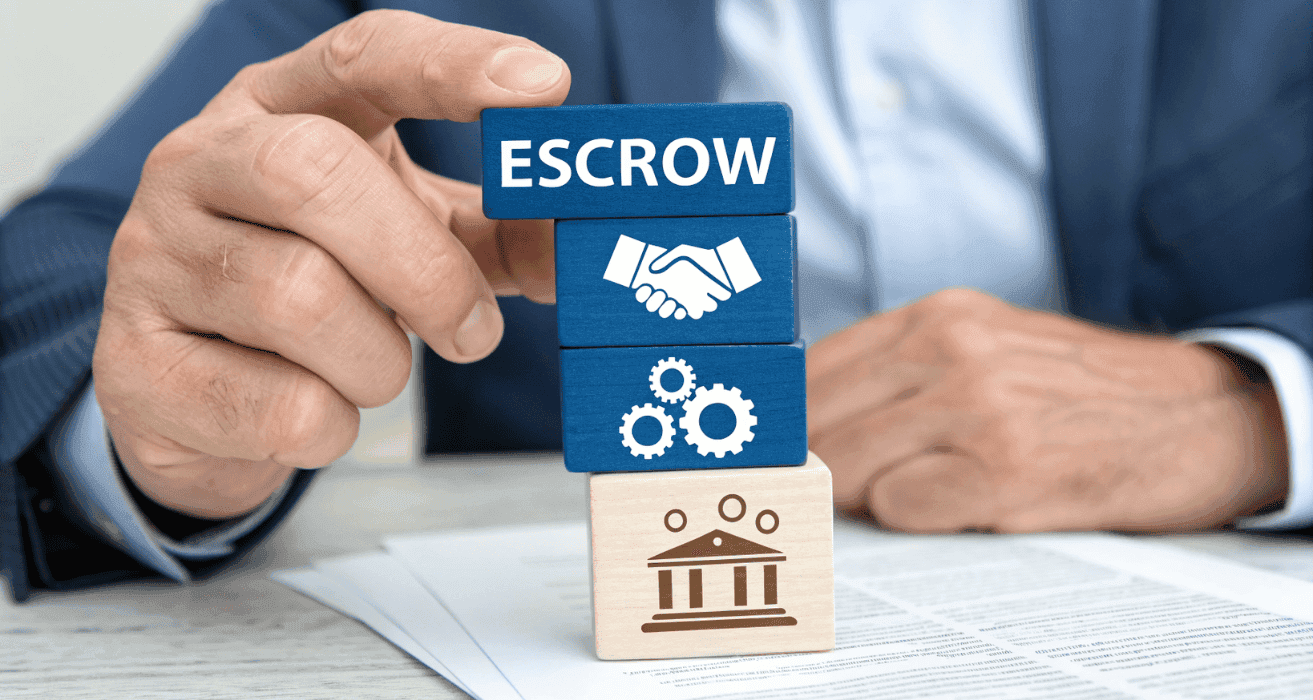How Escrow Protects Homeowners and Lenders?
July 30, 2025
9 minutes

Buying a home is exciting, but let’s be honest: it’s also overwhelming. Between closing costs, inspections, and paperwork, it’s easy to miss a key piece of the puzzle: your escrow account.
Here’s the thing: if you don’t understand escrow, you could end up confused when your mortgage payment changes or your insurance lapses unexpectedly. The good news? You’re about to become an escrow expert.
Let’s sort through the confusion and give you clarity. This blog will walk you through how escrow works in real-world terms, why it exists, and how to use it to your advantage.
Key Takeaways:
- Escrow accounts help homeowners manage key costs like property taxes and homeowners' insurance.
- Lenders use escrow to ensure these bills are paid on time, protecting both parties.
- Escrow can smooth out your monthly payments, but it may fluctuate with changing costs.
- Understand how escrow works to avoid surprise bills or account shortages.
- This guide applies to all borrowers, first-time buyers, investors, or those refinancing.
What Is an Escrow Account?
In the world of mortgages, an escrow account is like a safety net. It’s a separate account your lender sets up to hold money for property-related expenses, typically:
- Property taxes
- Homeowners insurance premiums
- Mortgage insurance (if applicable)
Rather than paying these bills directly, you make monthly payments into escrow along with your mortgage. When the bills are due, the lender pays them on your behalf.
Why Escrow Exists?
Think of escrow as protection for you and your lender:
- For Homeowners: It spreads big expenses out over the year, so you’re not hit with huge bills all at once.
- For Lenders: It ensures critical bills (like taxes) get paid, reducing the risk of property liens or uninsured losses.
Get Pre-Qualified and Save Up to 1.5% at Closing with reAlpha
Save up to 1.5% at closing when you combine real estate and mortgage services with reAlpha.

How Escrow Works in Your Monthly Mortgage?
Let’s say your annual property taxes are $4,000, and your homeowners insurance is $1,200. That’s $5,200/year or about $433/month.
When you close on your home, your lender estimates these costs and includes $433 in your monthly payment. They hold that money in escrow until the bills are due.
Heads up: Lenders often collect a 2-month buffer to prevent shortages. So your upfront closing costs may include a larger initial deposit into escrow.
Escrow Analysis: Why Payments May Change?
Once a year, your lender conducts an escrow analysis. If your taxes or insurance go up, your monthly escrow portion might increase.
Pro Tip: Always review your annual escrow statement. If there’s a shortage, you can either pay the difference upfront or have it spread across future payments.
Do All Loans Require Escrow?
Not always. Escrow requirements depend on:
- Loan Type: FHA loans and many conventional loans with less than 20% down require escrow.
- Lender Policy: Some lenders waive escrow for well-qualified borrowers.
- State Laws: Certain states have specific escrow rules and limitations.
Skipping escrow means you pay taxes and insurance on your own. This gives you more control, but also more responsibility.
Can You Remove the Escrow Later?
Yes, but only under certain conditions:
- Your loan must meet equity and payment history thresholds.
- You may need to submit a written request.
- Some lenders charge a fee to remove escrow.
Check with your servicer for specific requirements.
Stay Protected with Smart Escrow Management
Buying a home is a big decision - and having the right information puts you ahead. But the real advantage comes from pairing smart research with a smarter way to buy.
When you use a reAlpha real estate company, you can be eligible to receive up to 1% of the home purchase price back as a credit at closing. Add reAlpha Mortgage, and that rebate can increase to up to 1.5% back, helping offset closing costs and keep more money in your pocket when it matters most.
The rebate is simple, transparent, and applied directly at closing - no complicated hoops, no delayed payouts. Just real savings tied to using a fully integrated homebuying experience.
See how much you could save:
- Check your eligibility
- Explore homes that fit your budget today.
- Your next move could come with thousands back at closing.
Estimate your savings → Rebate Calculator
Ready to buy smarter, not harder? Start your savings journey with reAlpha Mortgage.
Buying a Home? Get up to 1.5% Cash Back at Closing
Get pre-approval first, then start exploring homes knowing you can receive up to 1.5% of the home price back at closing.

FAQs
What is escrow in simple terms?
Escrow is an account your lender uses to pay property taxes and insurance on your behalf, funded by part of your monthly mortgage payment.
Why did my mortgage payment increase because of escrow?
If your property taxes or insurance costs rise, your escrow payments go up, which can increase your monthly mortgage payment.
Can I get rid of my escrow account?
Possibly. Once you’ve built sufficient equity and have a strong payment history, some lenders allow you to cancel escrow.
Is escrow the same as closing costs?
No. Escrow is ongoing, part of your monthly mortgage. Closing costs are one-time fees paid at the beginning of the loan.
Disclosures & Compliance Notes:
- Content applies broadly to all borrowers. No government-backed loan types (e.g., VA, FHA) were promoted exclusively.
- Mortgage rates and fees mentioned are for educational illustration only and subject to change.
- reAlpha Mortgage is a licensed mortgage lender (NMLS #1743790).
- This is not a commitment to lend. All loans are subject to credit approval and property eligibility.
- Escrow requirements vary by lender, loan product, and state regulation.
- Services provided by reAlpha and reAlpha Mortgage are offered independently and may vary based on loan eligibility.
Ready to understand your mortgage and your escrow, on your terms? Let’s make that happen.
Get the latest market trends, homebuying tips, and insider updates—straight to your inbox. No fluff, just the good stuff.
Article by
Rocky Billore is a mortgage industry leader and Chief Sales Officer with over two decades of experience across residential and commercial lending. Since entering the industry in 2004, he has been directly involved in funding more than $1.4 billion in loans. A recognized expert in VA and government lending, Rocky combines deep program knowledge with a data driven, relationship-first leadership style. His work focuses on building scalable sales organizations, developing high performing teams, and aligning technology with real world lending outcomes to improve the homeownership experience.